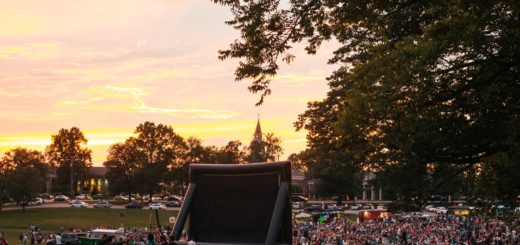FABLE OF A SONG @ Nashville Film Festival 2021
Once in a great while, something happens: a documentary filmmaker will set out to make one film, and then circumstances dictate that the director is compelled to make an entirely different film, about an almost-entirely different story. Probably the best example of this would be the Maysles brothers, whose Gimme Shelter was intended as a straightforward doc about a rock concert and then, in a word, wasn’t.
When Dean Fields, an artist manager who dabbles in filmmaking, set out to make Fable of a Song, his intention was simple and straightforward, an answer to his first line in the doc: “Where,” he wondered, “does a song come from?” To that end, he turned to two artists on his roster, Laurel Wright and Wes Lunsford, collectively known as The Young Fables (hence the title, see?), to film and record their process as they record a song called Daddy’s Girl.
We meet the Young Fables, and are taken through straightforward mini-biographies of each; I found myself thinking how much they resembled the 80s band Eurythmics who might be best known for their song, “Sweet Dreams are Made of This.”
If you draw out the comparison to the Eurythmics, then Laurel, a musical prodigy since birth, is Annie Lennox. the extremely vocal front and center of the group, whose singing voice is riveting. Wes, it follows, it Dave Stewart—the quiet guy in the background with the workmanlike attitude to creating music. (He even has a beard similar to Dave’s, circa the Sweet Dreams era.) The duo meet, they fall in love, they begin to create music, and enjoy the level of cult-appeal success so many indie bands know these days, and Fields travels to their home in Maryville, TN (east Tennessee, also the town that gave us former SNL star Melanie Hutsell, of Delta Delta Delta fame.)
Once we’re shown that the career of The Young Fables is off and running, we (via Dean) join them in early 2018 at a songwriting session in their home.
As a now-longtime veteran of the Nashville Film Festival, where docs about songwriting are de riguer, this was familiar territory; Laurel, Wes, and Dean in a circle, plucking at guitars, reviewing strands of lyrics Laurel has written (we learned in last year’s Bee Gees: How Do You Mend a Broken Heart that a similar process yielded the Gibb’s early effort New York Mining Disaster 1941.) Our protagonist couple are writing about something far more positive, however, their subject being (becoming as we watch them arrive at it) Laurel’s father, Ronald Wright, and her relationship to him; her stray lyrics and their stray chords congeal into the less-schmaltzy-than-you’d-expect Daddy’s Girl. The song is naturally flattering of Wright the Elder, not always so for Wright The Younger; a lyric that survives the earliest drafts posits that “you gave me the best years of your life/and I probably took some of yours.” Hoagy Carmichael it may not be, but it’s true, and in songwriting, that goes a long way.
We’re shown multiple scenes of the songwriting process, and then, towards the end of the film’s first act, we are introduced to a new character, hitherto unmentioned; Laurel, we learn, has a younger sister named Lindy. My temptation here is to say that Lindy’s story is a boilerplate take on the black-sheep-of-the-family narrative; unusually close to Laurel (and vice versa) through high school, she then takes up with an unfortunate crowd and falls into patterns of drug abuse. Of course, maybe I’m wrong and reductive to call it “boilerplate,” since it is less the product of some hack screenwriter as it is the true narrative of Lindy’s life.
It’s not evident at first glance why Lindy has been added to the narrative, and then it becomes all too clear why she has been factored in: remember how I said that circumstances will sometimes dictate that a documentary’s focus changes? Lindy becomes one of the two circumstances that will do so, when, on a night that The Young Fables are performing in Nashville, doing a set that includes the nascent Daddy’s Girl—Lindy, in the company of her unfortunate crowd, is fatally injured in a car accident in Knoxville.
Recreated footage causes us to ride along with Laurel and Wes as they hurry back from Nashville to Knoxville (a drive, for you non-Tennesseans, of about 3 hours) in the hope that they will arrive in time. They’re encouraged to do so by the person who finally gets through to Laurel on the phone. That would be her father, whose only counsel is a repeated and unusually calm charge: “Just get here. You need to get here.” Laurel recounts how her father’s voice is, in this moment, centering, gently placing her into this non-gentle reality.
As can be expected, Lindy’s passing sends Laurel into a spiral of grief, but she clings to songwriting and family, especially Wes and her dad, whom we actually get to watch listening to the final album cut of Daddy’s Girl, while Laurel sits in his lap. Both are beaming.
By this point in the film, however, we in the audience already know that Laurel’s journey through loss has only just begun, as she experiences a second, arguably greater loss during the filming, again while The Lost Fables are playing in Nashville, at the Opry, no less, in September of 2018. To blatantly say what happens would, I suppose, constitute a spoiler, and I won’t; I will say that basic reasoning and reviewing what I’ve told you so far will likely lead you to the right conclusion. Laurel herself arrives at something of a conclusion, a conclusion through which she’s still going; her loss history impacts her mental health, and she feels compelled to make her struggle public, which leads to others sharing their losses and struggles, forming a sort of community with Laurel. She had hoped to reach people as a songwriter, and she does, but her openness allows her to reach people in other ways, perhaps more profoundly.
One of the film’s many talking heads (a trope from which I suppose documentary cannot really escape) is one Dr. August Leming, an expert on human motivation who worked with Laurel on her journey; he’s on hand to provide deep truths about the songwriting process, and by extension, the grief process, truths which liberally contain the word heart. Hearts become a literal and figurative motif in this film, figurative in that they are this poetic, Romantic source for songs and truth, literal…I’ll let you see the film for that.
Fable of a Song is an impressive endeavor in that it has to move away from its intended subject several times, and yet comes naturally back to it, creating in the end literally what its title implies—the fable, the nigh-mythic origin story, of a song. Dean Fields suspected that exploring the source of a song would make an exceptional narrative. He was right. He had no idea how right he was.






















